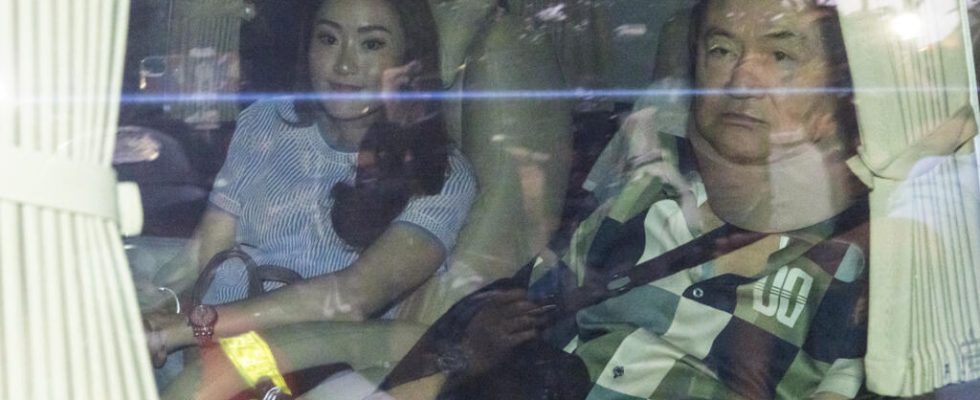Former Thai Prime Minister Thaksin Shinawatra was released on the morning of Sunday February 18. This comes six months after his return from 15 years of voluntary exile. His Pheu Thai party is suspected of having concluded a pact with its former adversaries – the monarchy and the army – to remove the reformist Move Forward party from power in exchange for the freedom of Thaksin Shinawatra, a central figure in Thai politics.
4 mins
Former Thai Prime Minister Thaksin Shinawatra was released on the morning of Sunday February 18. This comes six months after his return from 15 years of voluntary exile. His Pheu Thai party is suspected of having concluded a pact with his former adversaries in the monarchy and the army, thus removing the reformist Move Forward party from power in exchange for the freedom of Thaksin Shinawatra, a central figure in Thai politics.
The 74-year-old billionaire, in power from 2001 until the 2006 coup, was seen through his car windows, wearing a neck corset and sitting next to his daughter Paetongtarn, leaving the hospital police in central Bangkok. A handful of people protesting his release gathered outside the hospital.
He then returned to his home in Bangkok, the gate of which was decorated with a welcome banner made by his grandchildren.
Initially sentenced to eight years in prison for corruption and abuse of power, the former leader benefited in September from a pardon from King Maha Vajiralongkornalso known as Rama X. The latter reduced his sentence to one year of imprisonment.
In early February, authorities announced that the detainee fulfilled the conditions for early releasedue to his age and state of health.
Returned from exile on August 22, 2023 after 15 years abroadThaksin only spent a total of six months in detention, most of it in a police hospital in Bangkok, due to health problems.
He had been admitted to hospital just hours after returning from exile for problems with chest tightness and high blood pressure, and his family said he underwent two operations in the following months.
Saturday 17, Prime Minister Srettha Thavisin had confirmed that he would be released on Sunday. The framework for Mr. Shinawatra’s conditional release is not yet known, but he could have to wear an electronic bracelet or limit his travel, according to an expert interviewed Tuesday by AFP.
Suspicions of agreement with the army and the monarchy
Very popular in the early 2000s, especially among peasants in the North and Northeast, he is suspected of having concluded a pact with his former adversaries, the monarchy and the army, to regain freedom and escape justice. .
Indeed, Thaksin Shinawatra’s family party, Pheu Thai, agreed to form a government coalition with pro-army groups after the 2023 elections. The latter would not have been able to claim power following their large defeat. This agreement controversially excluded the real winner from the votethe reformists of Move Forward, who have become the main force of protest in the eyes of new generations.
Thaksin Shinawatra is an old lion of Thai politics, who maintains influence through the family party. Pheu Thai is now led by Paetongtarn, expected to continue the dynasty. She could become the third person to head the government to bear the name Shinawatra, after Thaksin and Yingluck. Her aunt (and sister of Thaksin) ruled the kingdom from 2011 to 2014, until a new coup d’état.
At the center of the deadly political crisis of reds against yellows
The mention of this surname awakens old fractures in Thailand. Thaksin Shinawatra was as much adored by the countryside – thanks to his pioneering redistribution policies – as he was hated by the traditional elites of Bangkok, who found him populist and insolent towards King Bhumibol, father of Rama X.
If he has been credited with good management of the economy, the leader, who made his fortune in telecommunications, has often been accused of mixing his private affairs with those of the State.
Tensions between these two factions of society peaked during the protests between his supporters – “ the red shirts » – and his opponents attached to the monarchy – « the yellow shirts “. In 2010, the army opened fire on a red shirt protest, killing more than 90 people.
Thaksin Shinawatra is also the subject accusations of lese majeste for comments made in 2015, but Thai justice has not yet decided what action to take in this case.
(With AFP)
Read alsoThailand: Prime Minister launches committee to amend Generals’ Constitution
